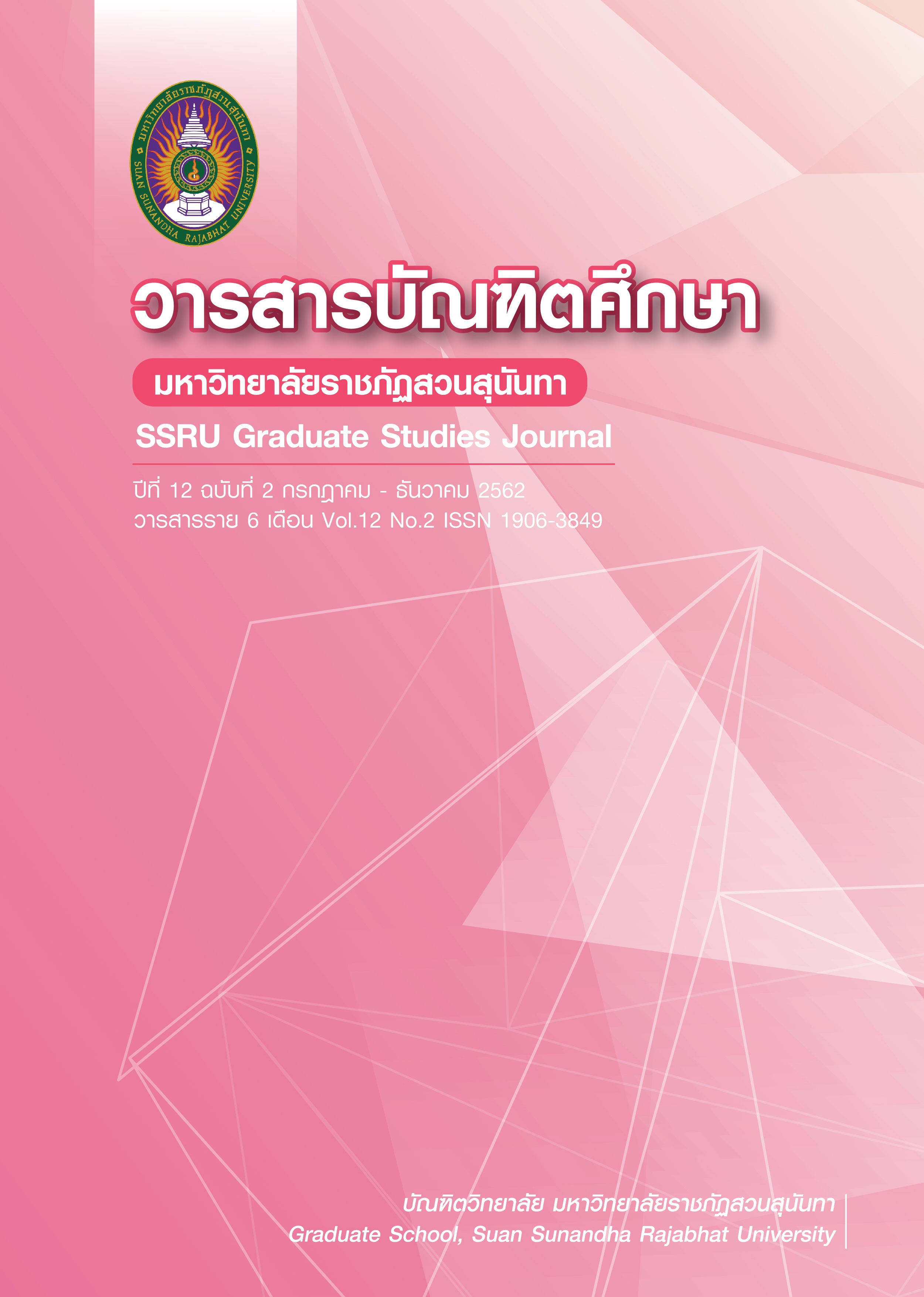Guidelines for Vocational Education Management in Phetchaburi Province for the Thailand 4.0 Policy
Main Article Content
Abstract
The objectives of the research were to study: 1) the state of vocational education management in Phetchaburi Province; and 2) guidelines for vocational education management in Phetchaburi Province in order to conform to the Thailand 4.0 policy. Key informants of the interviews consisted of 5 college directors and 7 deputy directors for academic affairs. The sample groups were 175 teachers of the vocational colleges in Phetchaburi province. They were selected by using cluster sampling technique. Additionally, 8 main informants who were the experts participated in a group conversation. The research tools used in this research included: 1) a five-scale questionnaire aiming to ask the state of vocational education management in Phetchaburi Province with a reliability value of 0.98; 2) a form for recording an empirical data; and 3) an interview guideline and a list of topics for a group discussion. Statistics used in the quantitative data analysis were percentage, mean, and standard deviation. As for the qualitative data, they were analyzed with content analysis. The research findings showed that: 1) the state of the vocational education management in Phetchaburi Province was at a high level in overall and when considering at each aspect, it was found that every aspect was also rated at a high level. The aspects of output of the vocational education management consisting of qualifications of the graduates and the colleges‘s academies achievement had the highest mean score. These were followed by the context aspects which were the identity of the colleges and the uniqueness of the colleges. The input aspects had the lowest mean score. For these aspects, four main problems were identified: (1) insufficient budget for the college management; (2) insufficient personnel because they generally moved back to home town or retired; (3) office supplies, equipment, and buildings being old, outdated, and deteriorated; and (4) a decrease number of students due to the reduced birth rate of population; 2) the guidelines for vocational education management for the Thailand 4.0 policy should be that: (1) the government should develop, adjust and/or improve the government regulations and rules as well as the laws related to the adjustment of roles, missions, and responsibilities of the colleges; (2) the vocational colleges in Phetchaburi Province should promote and develop the participation of the government sector, private sector and various establishments in the education management of the colleges; (3) the management team of the college should have an advanced vision and develop themselves on a continuous basis; and utilize a participatory approach in the development of the college so that their management would conform to the government policy; and (4) teachers should develop a learning management model for developing skills needed for the students in 21st century. This model should aim to develop the students’ analytical thinking skills, creativity, and ability for innovation creation. Moreover, the colleges should provide an education via various forms of digital technology.
Article Details
References
ช่างอุตสาหกรรม. วิทยานิพนธ์ครุศาสตรมหาบัณฑิต การบริหารการศึกษา, บัณฑิตวิทยาลัย มหาวิทยาลัยราชภัฏลำปาง.
ดวงนภา มกรานุรักษ์. (2554). อนาคตภาพการอาชีวศึกษาไทยในทศวรรษหน้า (พ.ศ. 2554 – 2564). วิทยานิพนธ์ปรัชญาดุษฎีบัณฑิต การบริหารการศึกษา, บัณฑิตวิทยาลัย มหาวิทยาลัยขอนแก่น.
บรรจง พลขันธ์. (2555). แนวทางการพัฒนาคุณภาพการจัดการเรียนการสอนของวิทยาลัยการอาชีพวาปีปทุม. วิทยานิพนธ์ครุศาสตรมหาบัณฑิต การบริหารการศึกษา, บัณฑิตวิทยาลัย มหาวิทยาลัย
ราชภัฏมหาสารคาม.
พระราชบัญญัติการศึกษาแห่งชาติ พ.ศ. 2542 แก้ไขเพิ่มเติม (ฉบับที่ 2) พ.ศ. 2545 และ (ฉบับที่ 3)
พ.ศ. 2553. (2553). ราชกิจจานุเบกษา. 127. (ตอนที่ 45 ก), 1.
พระราชบัญญัติการอาชีวศึกษา พ.ศ. 2551. (2551). ราชกิจจานุเบกษา. 125. (ตอนที่ 43 ก), 1 – 24.
พิศณุ ทองเลิศ. (2555). นวัตกรรมการบริหารงานอาชีวศึกษาระบบทวิภาคีในสถานศึกษาอาชีวศึกษา. วิทยานิพนธ์ปรัชญาดุษฎีบัณฑิต การบริหารการศึกษา, บัณฑิตวิทยาลัย มหาวิทยาลัยศิลปากร.
สาโรจน์ ขอจ่วนเตี๋ยว. (2560). การพัฒนารูปแบบการบริหารสถานศึกษาอาชีวศึกษา ประเภท
ช่างอุตสาหกรรม ภายใต้นโยบายประเทศไทย 4.0. กรุงเทพฯ: คณะกรรมการอาชีวศึกษา.
สำนักงานคณะกรรมการการอาชีวศึกษา. (2560). แผนพัฒนาการอาชีวศึกษา พ.ศ. 2560 – 2579
(พิมพ์ครั้งที่ 1). กรุงเทพฯ: คณะกรรมการอาชีวศึกษา.
สำนักงานคณะกรรมการอาชีวศึกษา. (2555). นโยบาย เป้าหมาย ยุทธศาสตร์ การผลิตและพัฒนากำลังคนอาชีวศึกษาสู่สากล พ.ศ. 2555 – 2569. กรุงเทพฯ: คณะกรรมการอาชีวศึกษา.
สำนักงานเลขาธิการสภาการศึกษา. (2560). แผนการศึกษาแห่งชาติ พ.ศ. 2560 – 2579 (พิมพ์ครั้งที่ 1). กรุงเทพฯ: พริกหวานกราฟฟิค.
สำนักเลขาธิการคณะรัฐมนตรี. (2557). คำแถลงนโยบายของคณะรัฐมนตรี. กรุงเทพฯ: สำนักพิมพ์คณะรัฐมนตรีและราชกิจจานุเบกษา.
สุวิทย์ เมษินทรีย์. (2559). Thailand 4.0 คืออะไร นโยบายนี้จะช่วยพัฒนาประเทศเราได้อย่างไร.
สืบค้นเมื่อ กุมภาพันธ์ 5, 2561, จาก http:// www.excise.go.th/cs/groups/public/documents/…/dwnt/…/uatucm282681.pdf.

